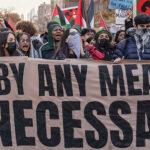On 9th May 1222, the Synod of Oxford passed several anti-Jewish rulings that discriminated against Jews and eventually led to their expulsion from England a few decades later. This year, a special 800th anniversary service was held in May at Christ Church in Oxford, where the Church of England apologised for the laws. Some have correctly pointed out that it was the Catholic Church in England that instituted the rulings, as the Church of England (CofE) didn’t exist at that time, but as the CofE is the primary state church in England today, as the Catholic Church was in 1222, they regarded it appropriate to lead the apology, which has been warmly received by Jewish leadership.
In this article, we’ll explain about this low point in Christian-Jewish relations in England and what the Church can learn today.
What happened at the Oxford synod?
The anti-Jewish decrees that passed in Oxford in 1222 trace their origins to Rome in 1215. Pope Innocent III convened the largest ecumenical council of church leadership that had ever been assembled, during which 71 canons were approved. The canons covered wide-ranging topics for church practice – four overtly mentioning Jews. They included rules for Jews wearing badges to distinguish them from Christians, guidelines for business with Jews, not allowing Jews to charge large interest, preventing Jews from holding public office and instructions on how to deal with Jewish converts to Christianity. Notably, converts were required to abstain from continuing any Jewish expressions in their new Christian faith.
The rules were Europe-wide but weren’t necessarily easy to enforce. The country that applied them the most successfully was England. In 1222, the Oxford Synod took the decrees and interpreted and applied them for an English context. This in turn was disseminated across local dioceses with each diocese applying the rules to various degrees. For example, Jews were banned from walking or riding a horse in towns or the countryside. The construction of new synagogues was prohibited. And Jews were not allowed to employ Christian servants.
Jewish life in England
Jews were an integral part of life in England prior to their expulsion. Since William the Conqueror had invited Jews to settle in England after the Norman conquest, Jews worked in skilled fields as doctors, goldsmiths and poets, etc. But the largest profession was the lending of money, due to the church in this period traditionally ruling that usury (money lending for interest) was illegal for Christians, but not for Jews. Cities such as London, Norwich and Lincoln prospered as Jews made an important contribution to the English economy.
Despite this, antisemitism was rife – predominantly caused by Christian attitudes towards Jews. The notorious ‘blood libel’ (the false accusation that Jews killed Christian children in rituals) that had spread throughout Europe in the previous century had led to anti-Jewish violence, including the massacre of Jews in York in 1190. Jews suffered prejudice and physical attacks and were often scapegoated for problems in society. Rather than trying to break the cycle of these hostilities, the church officially shifted from being tolerant of Jews to being complicit in anti-Jewish hate.
Even though antisemitism continued to be a problem among the ordinary population of the 1200s, Jews remained under the protection of the Crown. They were effectively ‘servants’ of the king. At the turn of the century, despite their population being under one percent, Jews were contributing around a twelfth of the royal revenue. Whilst Jews had special royal protection, it also meant they were vulnerable to exploitation by kings and the government.
Due to a failed campaign against France, King John, in 1210, singled out Jews demanding that they contribute to paying off the debt. With escalating debt, his successor, King Henry III, continued placing high taxes on Jews and seized increasing amounts of Jewish property each year. Instead of inheritance money going to their children after death, it went to the Crown. As the Crown continued to exploit the Jews, Jewish lenders had no choice but to sell off their debt to other lenders who were far stricter, but Jews still got the blame for wealthy people’s worsening financial hardships. Eventually the Jews were banned from charging interest altogether by Edward I in 1275.
In 1290, Edward had run up such large debts through wars abroad, he needed to negotiate a financial settlement with parliament. It remains a stain on English history that in order to get parliament’s permission for a loan, Edward decided to barter the entire Jewish population and expel them from England.
Jews didn’t return to England until 1656, when Oliver Cromwell made a promise for Jews to return, allowing them to integrate properly in English society and practice their faith freely.
The badge
One of the most controversial laws of 1222, which is disturbingly reminiscent of the darkest period in the 20th century, was the requirement for Jews to wear badges. Rome took this idea from what Christians and Jews had experienced under Muslim control where both groups, or ‘People of the Book’ as they were known, lived under Sharia under dhimmi status.
Following the church’s edict, in 1217 King Henry III ordered male Jews to wear a badge made on the front of their outer garments. Rather than stand up to such nonsense, the church in England shamefully gave legitimacy to this discrimination.
In 1275, fifteen years before the Jewish expulsion, King Edward I instructed the wearing of badges for Jews, fully implementing what the church had called for decades earlier. He even specified the colour of the badge and its size. Jews over the age of seven were required to wear a piece of yellow taffeta, six fingers long and three wide, over the left chest of the outer garment and depicted the Tablets of the Law (the Ten Commandments).

A miniature on an English medieval manuscript shows Jews wearing
a yellow badge in the shape of two tablets, whilst being beaten.
Lessons from 1222 for the Church today
Even though the church landscape is very different in 2022 than in the 13th century, here are three lessons from the 1222 synod for consideration today.
To distinguish it from the English church in 1222, we use the capitalised word ‘Church’ in its Biblical context for the body of believers in Christ and in application could refer to the local church, established church in Britain today, etc.
The dangers of false teaching
Firstly, the rulings of 1222 stemmed from a systemic, flawed theology and teaching regarding the Jewish people and the connection and relationship between Israel and the Church. The forced severing of the Jewish roots of the Christian faith created a legacy that gave rise to church-sanctioned antisemitism that the Jewish people in England shamefully experienced. It also caused division and relationship breakdown between Jews and Christians. Furthermore, the church was responsible for denying Christians the opportunity to fully immerse themselves in the rich teaching about Israel and the Jewish roots of Christianity. They starved the people of the spiritual blessings that God promises when a nation blesses the Jewish people.
Is the Church immune to making the same mistake today? We must pray for Church leadership, which is accountable for harnessing a Biblical narrative regarding the Jewish people and not lead its flock into the sin of antisemitism. We pray that the Church will awaken to the Biblical commission to love Zion in acts and in words.
Christ loves His Church and He loves Zion. Therefore, the Church should love Zion. Pray that the Church today will teach about Israel faithfully and without compromise.
The complacency in teaching about Israel and the rise of replacement theology that has embedded itself in the Church today must be rolled back. Pray that the lack of discernment that wilfully accepts a false narrative cloaked in the name of social justice will be rejected. Instead, pray we will see a vibrant and flourishing Church in Britain that is richly blessed, because it has blessed Jesus’s own brethren.
The gradual rise of antisemitism
Secondly, antisemitic attitudes towards Jews were allowed to fester gradually. The expulsion of Jews didn’t happen immediately. It was nearly 70 years from the Oxford Synod’s passing of anti-Jewish laws before the decision was made to expel every Jew from England, but the church was responsible for creating a culture of hostility towards Jews. Pray that the Church will speak out against antisemitism in all its forms today without any hesitation. Britain’s stand with Israel begins with the Church. We cannot allow antisemitism to take a foothold.
Influencing the nation’s culture
Thirdly, the church in 1222 had a harmful influence upon the nation’s culture. In fact, the church in 1222 also allowed itself to be influenced detrimentally by the culture surrounding it rather than taking a stand. When antisemitic tropes were widespread in society, rather than the church stand up against the twisted lies and rebuke the anti-Jewish prejudice, a morally weak church instead bought into them and even became a mouthpiece for the falsities.
Today, these two aspects should be reversed: the Church is called to be separate from the world, and at the same time is called to be truth-bearers to a world that is in moral decline.
The Church has the spiritual authority from God, not from man, to be a godly influence upon today’s culture. It has potential to make a positive impact on the national landscape and lead by example. But it must also guard against being influenced by a culture that is opposed God.
Pray that there will be a hunger for Biblical Truth in relation to Israel that brings revelation to many and redefines the culture of the Church in Britain today. We pray for a Church culture that is faithful to God’s Word, gives preference to His everlasting Covenant to the Jewish people, defends their right to their ancestral homeland, respects and honours our Jewish friends, loves Zion as Jesus loves Zion, appreciates the roots of our faith, and draws us closer to the God of Israel and His people.
These are days in which we must stand firm on what the Bible says about Israel and the Jewish people. Britain’s stand with Israel begins with the Church. Our prayer is that the Church in this century will see an outpouring of blessing over this nation, by rejecting antisemitism, loving Zion and defending her people.
“Therefore take up the whole armour of God, that you may be able to withstand in the evil day, and having done all, to stand.”
Ephesians 6:13











